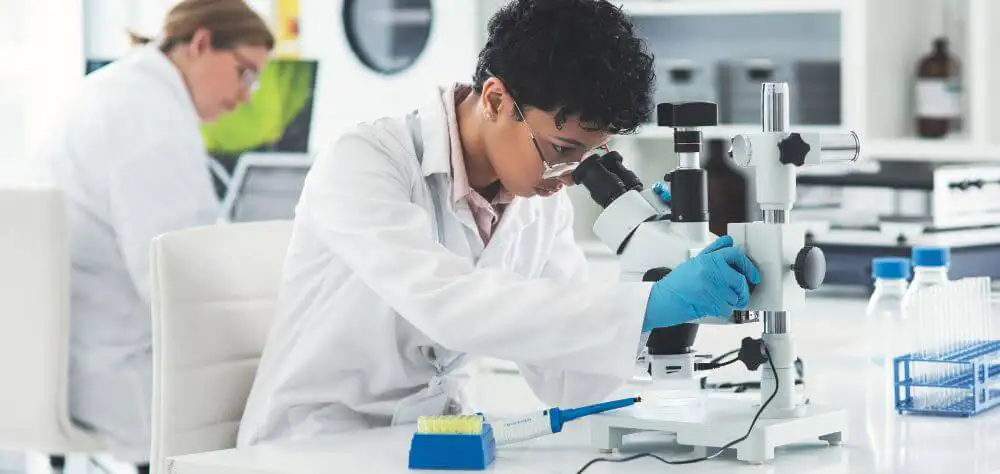What Can You Do with a Biotech Degree? Career Options to Consider
What can you do with a biotech degree? The answer is more diverse than you might think. Biotechnology is a rapidly growing field that blends science, technology, and healthcare to drive medical breakthroughs, genetic research, and pharmaceutical advancements. With the rise of precision medicine and bioengineering, professionals with a biotech background are in high demand across multiple industries, from healthcare and research to regulatory affairs and business development.
Whether you’re interested in genetic counseling, clinical research, or biotech entrepreneurship, a strong foundation in health sciences can help you break into this exciting field. At Southern California University of Health Sciences (SCU), our Bachelor of Science in Health Sciences (BSHS) program provides students with essential biomedical knowledge and specialized concentrations to prepare for careers in biotechnology and beyond.
What is Biotechnology? Understanding the Field
At its core, biotechnology is the application of biological principles to develop technologies and products that benefit society. Scientists and researchers in this field use cells, DNA, and living organisms to create everything from vaccines and medicines to renewable energy sources and genetically modified crops. It’s an industry that combines biology, chemistry, and engineering to tackle some of the world’s biggest challenges—improving human health, increasing food production, and developing sustainable solutions for industries worldwide.
Whether it’s genetic engineering in medicine, developing eco-friendly materials, or revolutionizing agriculture, biotechnology is a field that bridges science and technology to improve lives. Let’s take a closer look at its key areas and how they’re shaping the world around us.
Medical & Pharmaceutical Biotechnology
Modern medicine wouldn’t be the same without biotech. This sector focuses on developing life-saving drugs, gene therapies, and cutting-edge treatments for diseases once thought incurable. Scientists use genetic engineering to modify DNA, create targeted medications, and even explore personalized medicine, tailoring treatments to an individual’s genetic makeup.
- Drug development From vaccines to cancer treatments, biotech drives pharmaceutical innovation.
- Genetic engineering Editing genes to prevent or treat diseases.
- Regenerative medicine Using stem cells to repair damaged tissues and organs.
Agricultural Biotechnology
Feeding a growing global population requires smarter farming solutions. Agricultural biotechnology helps create higher-yield, pest-resistant crops, drought-tolerant plants, and sustainable farming techniques that improve food security.
Industrial & Environmental Biotechnology
Beyond healthcare and agriculture, biotechnology plays a major role in developing renewable energy, biodegradable materials, and eco-friendly solutions for industrial processes.
Industrial Biotechnology
Biotech fuels industries by replacing harmful chemicals with bio-based materials and improving manufacturing processes.
Environmental Biotechnology
Biotechnology is being used to clean up pollution, improve waste management, and develop solutions for a more sustainable planet.
- Pollution control Using microbes to break down oil spills and industrial waste.
- Waste management Converting organic waste into energy or biodegradable materials.
Biotechnology is shaping the future of medicine, agriculture, and sustainability. With new discoveries emerging every day, the potential for innovation is limitless, making this field an exciting and ever-evolving space for those passionate about science, technology, and problem-solving.
What Can You Do with a Biotech Degree? Top Career Options
A biotechnology degree is a great gateway to careers in medicine, environmental science, agriculture, and business. With advancements in genetic engineering, sustainable technology, and biotech innovation, companies across multiple industries are looking for skilled professionals to drive scientific progress.
Whether you want to develop new medical treatments, improve food production, or help biotech startups navigate regulations, there’s a career path for you.
Healthcare & Medical Biotechnology Careers
If you’re passionate about using science to improve human health, the healthcare sector offers some of the most impactful careers in biotechnology. These roles focus on disease prevention, genetic research, and medical innovation.
- Biomedical Researcher Conduct laboratory experiments to develop new treatments, study disease mechanisms, and test drug safety before clinical trials.
- Genetic Counselor Help patients understand genetic risks for diseases by interpreting test results and providing health guidance. A strong foundation in Pre-Genetic Counseling is a great pathway to this career.
- Clinical Laboratory Scientist Work in hospitals and diagnostic labs analyzing blood, tissue, and DNA samples to detect diseases and infections.
- Biotech Sales & Product Specialist If you have a knack for science and communication, this career involves working with pharmaceutical and medical device companies to market biotech products to hospitals and clinics.
With biotech-driven medicine on the rise, professionals in this sector are helping shape the future of healthcare.
Environmental & Agricultural Biotechnology Careers
Biotechnology is revolutionizing how we protect the planet, grow food, and manage natural resources. If you’re interested in sustainability and innovation, these careers could be a perfect fit.
- Environmental Biotechnologist Develop bio-based solutions for waste management, pollution control, and renewable energy. From bacteria that break down plastic to microbes that clean oil spills, the work is both impactful and cutting-edge.
- Agricultural Biotechnologist Improve crop yields, develop pest-resistant plants, and create sustainable farming techniques using genetic modification and microbiology.
- Bioinformatics Specialist Use data science and machine learning to analyze biological data. This role helps environmental and agricultural scientists make sense of massive genetic datasets to improve conservation, climate resilience, and food production.
These careers offer a way to apply biotech knowledge to real-world ecological challenges, shaping a more sustainable future.
Business & Regulatory Careers in Biotech
Biotechnology isn’t just about the science—it’s also about making sure innovations reach the market safely and legally. If you’re interested in biotech’s intersection with business and policy, consider these roles:
- Regulatory Affairs Specialist Work with government agencies like the FDA to ensure biotech products, from new drugs to medical devices, meet safety regulations before they reach the public.
- Biotech Consultant Advise biotech startups and research firms on business strategies, funding, and product development. This is a great path for those who enjoy both science and entrepreneurship.
- Intellectual Property & Patent Analyst Specialize in biotech law, helping companies secure patents and navigate the complex world of intellectual property for genetic engineering, pharmaceuticals, and medical devices.
With biotechnology expanding rapidly, the demand for experts who understand both science and business is higher than ever.
The Skills You Need for a Thriving Career in Biotech
Biotech is where science meets innovation, and landing a job in this industry takes more than just technical knowledge. Employers look for professionals who can analyze data, think critically, and navigate regulatory landscapes—all while effectively communicating complex ideas.
Whether you’re drawn to genetic research, biotech sales, or regulatory affairs, mastering the right skills and qualifications will set you up for success. Let’s break down what you’ll need.
Technical Skills That Matter
Success in biotech starts with a strong foundation in lab techniques and data analysis. Whether working in research, pharmaceuticals, or genetic counseling, these skills are essential:
- Laboratory Techniques: PCR, CRISPR, cell culture, and molecular cloning.
- Data Analysis & Bioinformatics: Managing large biological datasets, statistical modeling, and coding skills (Python, R) for biotech applications.
- Regulatory Knowledge: Understanding FDA guidelines, compliance protocols, and biotech product approval processes.
Soft Skills for Biotech Professionals
Beyond lab work, biotech careers demand sharp problem-solving abilities and strong communication skills. Professionals in this field often work in cross-disciplinary teams and must translate scientific findings into actionable insights.
- Critical Thinking & Problem-Solving: Ability to analyze research results, troubleshoot experiments, and make data-driven decisions.
- Communication Skills: Essential for roles like genetic counseling, biotech sales, and research collaboration.
- Business Acumen: Understanding market trends, entrepreneurship, and biotech consulting strategies.
Additional Certifications & Education
Certain biotech careers require specialized certifications and advanced degrees to unlock leadership roles and higher-level research positions.
- Certified Genetic Counselor (CGC): Required for professionals specializing in genetic counseling.
- Regulatory Affairs Certification (RAC): Ideal for biotech professionals navigating regulatory processes.
- Advanced Degrees (MS, PhD): Necessary for specialized roles in genetic research, pharmaceuticals, and bioinformatics.
Biotech is an evolving field, and staying ahead means continuously learning, adapting, and refining your expertise. Whether through hands-on lab work or advanced education, building the right skill set is the key to a thriving career.
The SCU Advantage: Preparing You for a Future in Biotechnology
Biotechnology is driving some of the biggest breakthroughs in medicine, genetics, and public health, and the right education can put you at the center of it all. At SCU, our Bachelor of Science in Health Sciences (BSHS) program offers a flexible, transfer-friendly pathway for students eager to enter the fast-growing biotech industry.
SCU’s BSHS Program Overview
SCU’s Bachelor of Science in Health Sciences is designed for students who want a career in healthcare, research, or biotechnology. Our program provides:
- A fully online, flexible curriculum that fits into your life.
- A transfer-friendly structure, allowing students to customize their degree with biotech-relevant concentrations.
- A focus on real-world applications, preparing students for roles in genetic counseling, research, and biotech product development.
Enhanced Learning Comprehension
Success in biotechnology requires deep understanding, not just memorization. That’s why we structure our courses to maximize learning:
- Students take two focused courses per term instead of juggling four or more.
- Each course runs for seven and a half weeks, providing better mastery of complex scientific topics.
- The format allows for stronger retention and real-world application of biotech concepts.
Customize Your Biotech Career with the Right Concentration
Choosing the right specialization can set you apart in the biotech field. SCU offers career-focused concentrations that prepare students for genetic research, clinical sciences, and biotech education.
- Human Genetics and Genomics: Focuses on human heredity, genetic research, and clinical applications. Prepares students for careers in genetic counseling, bioinformatics, and research, with a direct pathway to our MS in Human Genetics and Genomics (MSHGG).
- Pre-Genetic Counseling: Designed for students pursuing a Master’s in Genetic Counseling. Covers genetics, ethics, and counseling techniques, and eligible graduates are guaranteed an interview for SCU’s Master of Science in Genetic Counseling (MSGC).
- Health Education CHES® Preparation: Ideal for students interested in biotech education and public health advocacy. Prepares students for the Certified Health Education Specialist (CHES®) exam, a credential recognized in biotech outreach, education, and policy roles.
We offer even concentrations—explore all available options here.
Biotech Careers Are Waiting—Are You Ready?
What can you do with a biotech degree? The possibilities are vast, spanning healthcare, research, genetic counseling, and biotech entrepreneurship. The industry thrives on professionals who combine technical expertise with critical thinking and communication skills, making it an exciting field for those eager to shape the future of medicine, sustainability, and technology.
If you’re ready to step into the world of biotechnology, SCU’s Bachelor of Science in Health Sciences (BSHS) program offers the flexibility, concentrations, and career preparation you need. Explore our admissions page, review program details, and apply today.
FAQs
What can you do with a biotech degree?
A biotech degree opens doors to careers in genetic counseling, pharmaceuticals, biomedical research, biotech sales, and regulatory affairs. You can work in hospitals, labs, biotech startups, or even environmental conservation—wherever science and innovation come together to solve real-world challenges.
Do I need a master’s or PhD for a career in biotech?
It depends on the career path. Some roles, like genetic counseling or biotech research, require advanced degrees, while careers in biotech sales, regulatory affairs, and lab sciences often only require a bachelor’s degree with relevant experience.
Is biotech a good career choice for the future?
Absolutely. With advances in gene therapy, personalized medicine, and sustainable biotech solutions, the industry is growing fast. Biotech professionals are in demand in healthcare, environmental science, and pharmaceuticals, making it a strong career choice with plenty of opportunities.
Can I complete the BSHS program online?
Yes! Our BSHS program is fully online, allowing students to study full-time or part-time from anywhere. It’s designed for flexibility, making it ideal for those balancing work, school, or other commitments.
How do I apply to the BSHS program at SCU?
Applying is simple! Review our admissions page and submit your application. With multiple start dates throughout the year, you can begin your journey toward a biotech career when it works best for you
Related Posts





